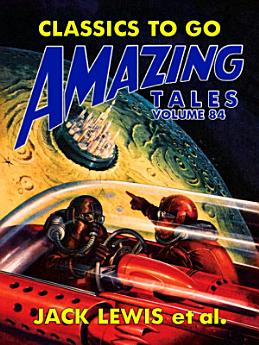Amazing Tales Volume 84
Jack Lewis et al.
Jan 2025 · CLASSICS TO GO Book 84 · Otbebookpublishing
Ebook
190
Pages
family_home
Eligible
info
reportRatings and reviews aren’t verified Learn More
About this ebook
Step into the corridors of imagination with "Amazing Tales Volume 84", an extraordinary anthology offering unparalleled expedition. This collection is your passport to extraordinary worlds where science fiction seamlessly intertwines with the thrill of the unknown, creating narratives as compelling as they are diverse. Each story in this collection captures the essence of humanity's indomitable spirit in the face of insurmountable odds, set against rich backdrops ranging from the specter of atomic warfare to the mysterious landscapes of alien planets. Delight in the suspense woven by Charles F. Myers' "The Vengeance of Toffee", where magic dances with technology to stave off global disaster, testing the bounds of what is possible. Engage with the profound moral complexities in Jack Lewis' "Jekyll-Hyde Planet", a new Eden fraught with dilemmas that threaten to turn paradise into pandemonium. Myers transports you into a shadowy criminal underworld with "Double Identity", a noir-laden narrative rich with twists and dangerous turns. Lewis returns with "Purple Forever", inviting you to untangle the enigma of Venus and unravel secrets that challenge your understanding of identity and truth. Not to be outdone, Melvin Sturgis delivers a masterstroke of psychological tension with "The Unprotected Species", set against the haunting chill of an alien terrain. In "The Gift", Sturgis captivates with a courtroom drama that questions the boundaries between fear and awe, as extraordinary powers come under the spotlight. From tales of heroic intervention to profound moral transformations, this anthology runs the gamut of emotions and intellect, seamlessly blending suspense, intrigue, and the allure of distant worlds. Prepare to find your next favorite story among these pages—be it in the dystopian echoes, cosmic battles, or psychological intricacies. "Amazing Tales Volume 84" isn't just a collection of stories; it's an invitation to lose yourself in the transformative power of speculative fiction. Whether you are a veteran explorer of otherworldly realms or a newcomer eager for adventure, this volume promises not just a read, but a profound journey of the mind and spirit.
About the author
Jack Lewis, born in 1921 in a small town in Ohio, emerged as a pivotal figure in mid-20th century speculative fiction. His early life was marked by the Great Depression, which instilled in him a profound empathy for the underprivileged and a fascination with societal structures. After serving in World War II, Lewis channeled his experiences into writing, blending his gritty realism with imaginative storytelling.Lewis's literary contributions are notable for their exploration of human resilience and ethical dilemmas in fantastical settings. His works often grapple with themes of technological advancement and its impact on society, making him a forerunner in the genre of science fiction. His 1953 short story, "The Last Machine," is credited with influencing the cyberpunk movement, predating the works of William Gibson and Bruce Sterling.Controversy was never far from Lewis. His outspoken criticism of McCarthyism and his defense of civil liberties during the Red Scare earned him both admirers and detractors. This bold stance not only cemented his reputation as a writer unafraid to challenge the status quo but also made him a target of government scrutiny.Lewis's influence extends to contemporary writers like Neil Gaiman and Margaret Atwood, who cite his ability to weave complex moral questions into compelling narratives as a significant inspiration. His revolutionary ideas about the intersection of humanity and technology continue to resonate, making him a timeless figure in literary history.Jack Lewis passed away in 1987, but his legacy endures, reminding readers of the power of speculative fiction to reflect and critique the human condition.
Rate this ebook
Tell us what you think.
Reading information
Smartphones and tablets
Install the Google Play Books app for Android and iPad/iPhone. It syncs automatically with your account and allows you to read online or offline wherever you are.
Laptops and computers
You can listen to audiobooks purchased on Google Play using your computer's web browser.
eReaders and other devices
To read on e-ink devices like Kobo eReaders, you'll need to download a file and transfer it to your device. Follow the detailed Help Center instructions to transfer the files to supported eReaders.







